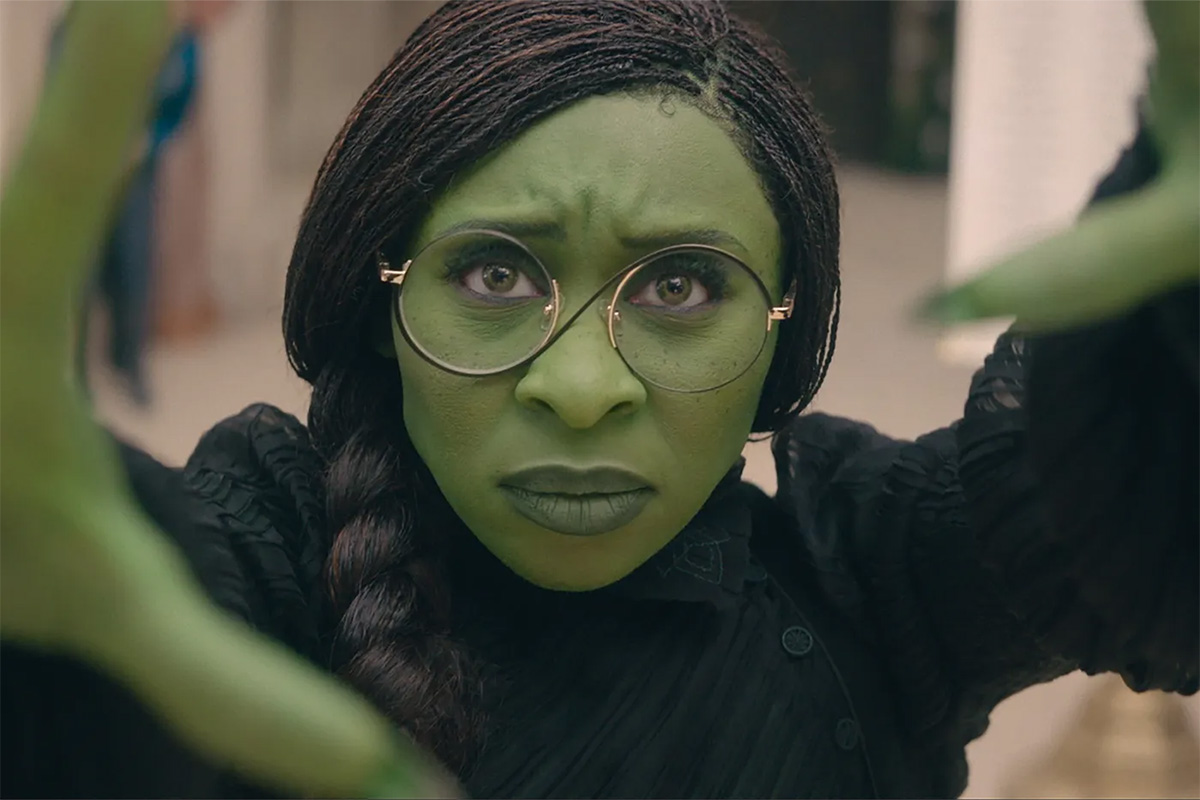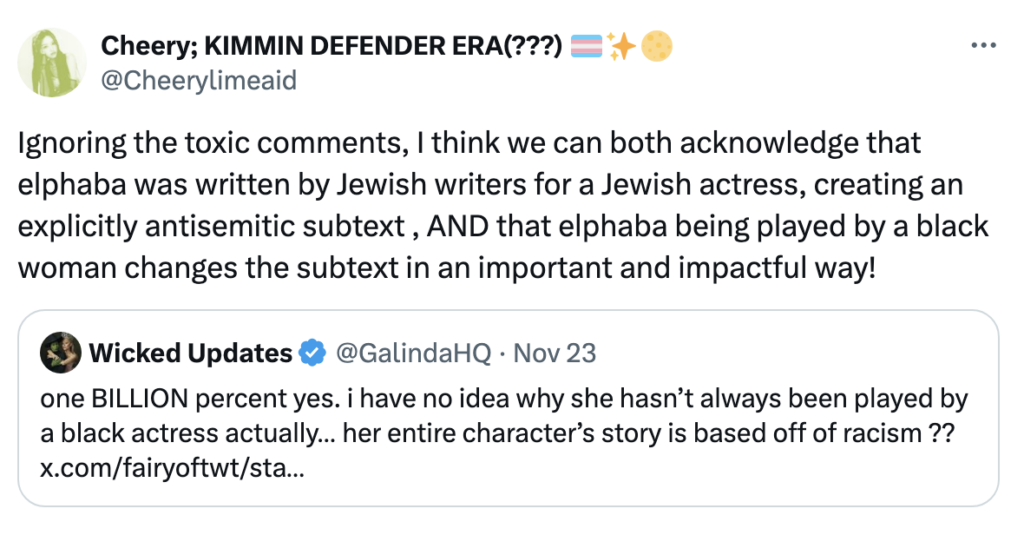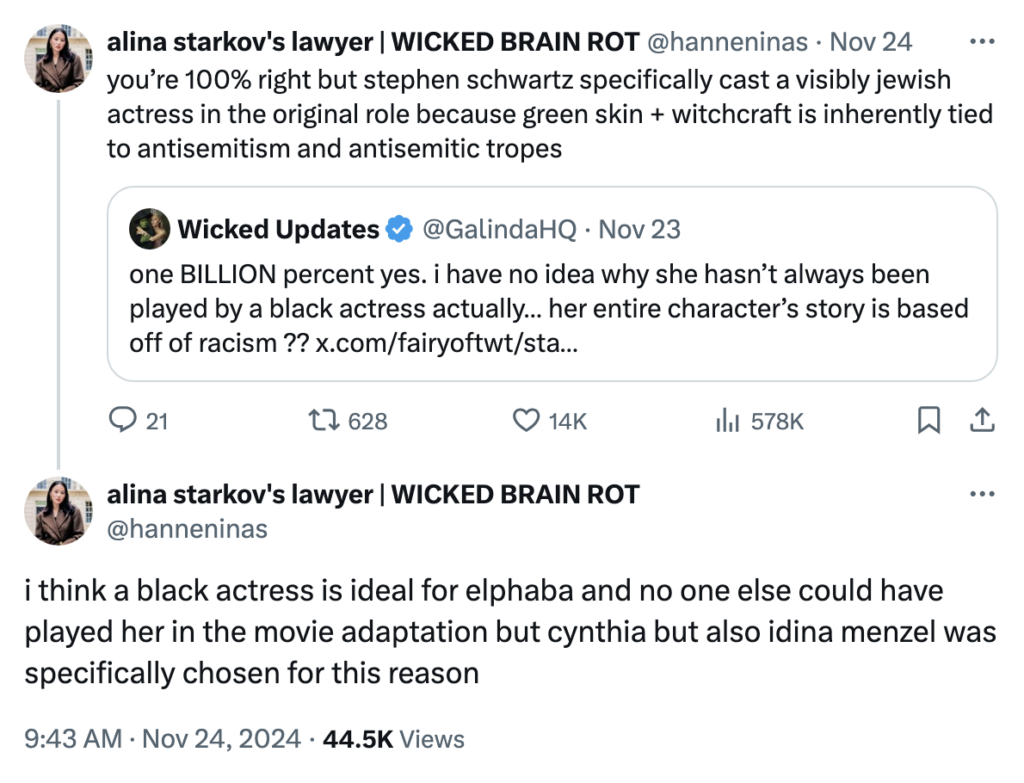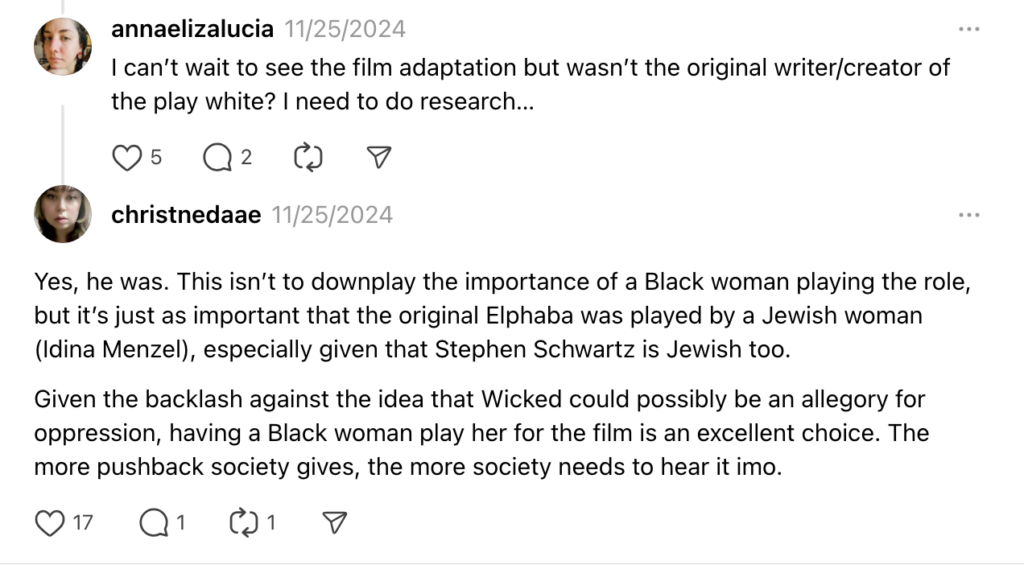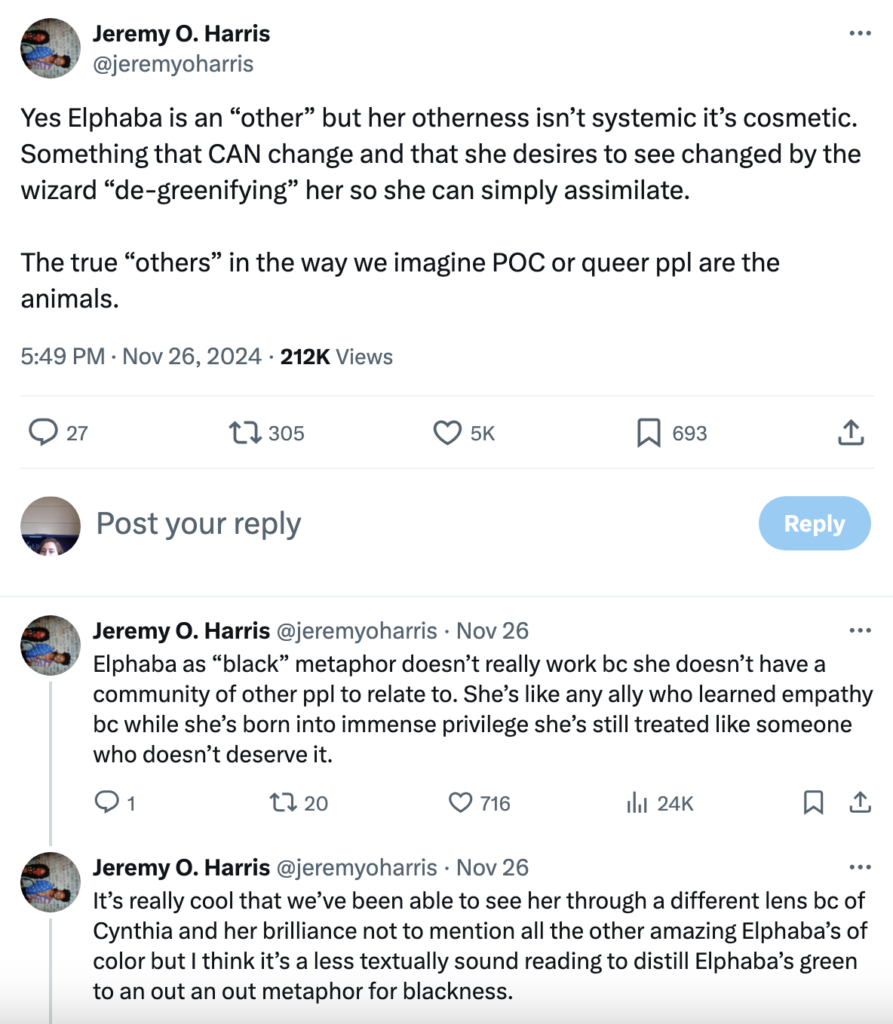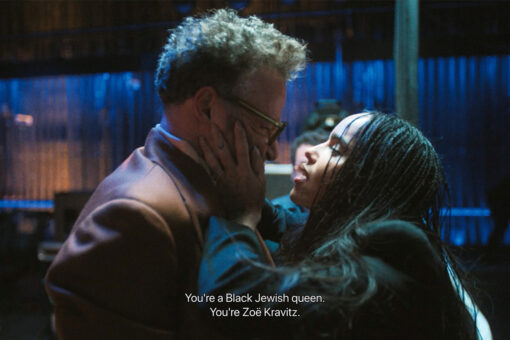Editorial note: Spoilers ahead for “Wicked.”
To quote the Broadway smash-hit musical “Wicked“: What is this feeling, so sudden and new?
Could it be the supreme catharsis and joy that “Wicked, Part I” is out in the world?
Yes. Yes it is.
On Nov. 22, Jon M. Chu’s two-hour and forty minute filmed adaptation of “Wicked” act one came to theaters and the reaction has been immense. Audiences and critics agree that actresses Cynthia Erivo and Ariana Grande are a perfect pair — hilarious and heartening together, each bringing new life to the “Wicked” soundtrack with their powerhouse voices. That in combination with a deep ensemble cast and the out-of-this-world sets, costumes and choreography has cemented “Wicked, Part I” as a cultural and cinematic touchstone. Already, people are holding space for its Oscar chances, the entire press tour and, unsurprisingly, its onscreen representation.
“Elphaba being played by a black woman added depth and relatability to her character!” one user on X wrote. (The post has since been deleted.) “one BILLION percent yes. i have no idea why she hasn’t always been played by a black actress actually… her entire character’s story is based off of racism ??” Wicked Updates responded. Buoyed by these tweets, many others online have begun discussing the casting history of “Wicked,” whether Elphaba is an inherently Black or Jewish character and if the story itself is a specific historical allegory for the Holocaust.
It’s a lot to unpack and sort through, so let’s break down all the “Wicked” casting discourse.
I have just arrived from Mars and I don’t know what “Wicked” is.
Buckle up. “Wicked” is a 2003 Broadway musical with music and lyrics by Stephen Schwartz and the book by Winnie Holzman; the musical was loosely adapted from the 1995 novel “Wicked: The Life and Times of the Wicked Witch of the West” by Gregory MaGuire, which, in turn, is based upon L. Frank Baum’s 1900 novel “The Wonderful Wizard of Oz” and its 1939 film adaption starring Judy Garland. The musical has now been adapted into its own movie. The first part came out on Nov. 22, 2024 and part two will come out on Nov. 21, 2025.
The musical and movie musical tell the story of “The Wizard of Oz” from the point of view of its villain: The Wicked Witch of the West. But before she was the Wicked Witch, the scourge of all of Oz was just a girl named Elphaba Thropp. With green skin and magical abilities, Elphaba is othered her entire life, including when she arrives at Shiz University. She and her roommate — a preppy, popular, pink-loving girl named Galinda, Glinda for short — initially butt heads. But eventually they become friends and work together, navigating the treacherous politics of Oz and the fascistic Wizard.
OK. Remind me, who plays Elphaba in the movie and on Broadway?
Jewish actress Idina Menzel originated the role on Broadway in 2003, and Cynthia Erivo was cast as Elphaba in the movie in 2021. Notably, “Wicked” on Broadway has a long line of Jewish actress who have taken on the role. Aside from Idina Menzel, they include Shoshanna Bean, Caissie Levy, Lindsay Mendez and Talia Suskauer. Aside from Cynthia Erivo, actress Alexia Khadime was the first Black woman to play Elphaba full-time in a major production of “Wicked.” She did so on the West End from 2008-2010 and again in 2023. Additionally, actress Saycon Sengblog was a standby for Elphaba on Broadway, and Brandi Chavonne Massey understudied Elphaba on Broadway.
So what have people been saying online about “Wicked” casting?
In addition to the users on Twitter who said that Cynthia Erivo’s casting “added depth and relatability to her character” and “i have no idea why she hasn’t always been played by a black actress actually…,” here’s what some other people have been saying:
Wait, hold up. Witches are kind of like antisemitic caricatures?
Yes. In “The Antisemitic History of Witches,” writer Emma Shachat notes that in medieval and early modern Europe, witches were thought to have pacts with the Devil and have Satanic features like talons and horns, commit acts of beastiality, have an appetite for newborn babies and were inherently unclean. Sound familiar?
Shachat writes: “European constructions of the witch actually come from a long line of myths about “Jewish ‘heresy’ and the nature of its persecution,” notes Yvonne Owens, a professor of Art History and Critical Studies at the Victoria College of Art.” Even the pointy black witch’s hat we see everywhere around Halloween has Jewish origins — after 1215, European Jews were required to wear a cone-shaped judenhut. “So closely were Jews associated with Satanic threats that a law was passed in 1431 in Hungary requiring those accused of sorcery to wear ‘peaked Jew caps,‘” Shachat adds.
Essentially, witches in the early modern European imagination were a symbol for the ultimate other. As non-Christians, Jews were a readily available population to both base and ascribe these traits to.
And was Idina Menzel cast in “Wicked” because she is Jewish?
I haven’t been able to find a source which states that Idina Menzel’s Jewishness was a factor in her casting. “Every wonderful actor/actress on Broadway came in and auditioned, and Idina came in,” producer Marc Platt recalled. After she left the audition, Platt said that in terms of looking at other actors, “It wasn’t much [of a] conversation.”
“I had a really good audition up until the point that I sang ‘Defying Gravity.’ At the end, I cracked on the big note at the top. ‘You won’t bring meee down’ — that didn’t come out very good,” Idina Menzel told The Washington Post in 2024. “So I looked over at the accompanist and said, ‘I’m going to do that again.’ I backed up a little, nailed the note and then finished the song — ‘oh-ohhh!’ I think that mistake is actually what got me the role because [director] Joe Mantello said he could really see how fierce I could be.”
Got it. So, have the writers and creators of “Wicked” ever explained whether it’s a specific historical allegory?
It seems that “Wicked” is not explicitly an allegory for any one political or historical event. (Unlike “The Wonderful Wizard of Oz” which some posit alludes to 19th-century American populism and the bimetallism debate. Yes, I’m serious.)
Author Gregory Maguire wrote “Wicked” after reading a headline in the 1990s which asked: “Saddam Hussein: The Next Hitler?” His reaction to reading that headline inspired him to think about human response to jingoism, which in turn inspired him to write the novel. As The Denver Gazette notes, the book “alludes to everything from Hitler’s Germany to Richard Nixon to the first Bush administration.” However, some have found specifically Jewish resonances in the book.
The Gazette further reports, “The yellow-brick road was built by munchkin slave labor, the flying monkeys are the result of animal experimentation, and Oz is populated by a class-based society of oppressed animals. Scholars have equated these animals with Hitler’s Jewish victims, with Maguire’s blessing.” (However, I think it’s important to note that one could also read this as an allusion to American slavery and the Jim Crow South, where Black Americans were also enslaved, experimented on and oppressed.)
In terms of the musical, Stephen Schwartz has said that “Wicked” is not meant to speak only to the Jewish experience. “I think a lot of musical theatre themes speak to Jewish audiences because in many instances musicals are about outsiders, striving to discover how they might fit in,” he told the Jewish Chronicle in 2020. He went on, “‘Wicked‘ is not overtly Jewish-themed but it certainly resonates with many Jewish people’s experience.”
Have Cynthia Erivo or Idina Menzel chimed in on the discussion?
Neither Cynthia Erivo nor Idina Menzel have commented on the current discourse surrounding Elphaba casting. However, recently, Cynthia shared that Elphaba’s otherness resonates with her. “I just know what it’s like to feel like you don’t fit. Like you’re just outside of the ordinary, like there’s no room for you,” she explained. “I think the wonderful thing about that is that I know there are so many people watching who feel the same, so I feel like it’s a bit of a hug for anyone who feels that way,” she added.
What’s more, Cynthia, director Jon M. Chu and producer Marc Platt (father of Ben) had conversations during the development of the movie about how to ensure that she could bring her full self and full Blackness to Elphaba. So, as Variety reports, Cynthia “added a couple points of emphasis for Black women to relate, including the character’s long nails and a headful of microbraids.”
Platt also told Variety, “An actor always brings pieces of his, her or their life to characters they create. So it’s hard to separate out her journey as a queer Black woman where she has felt as an ‘other,’ as an outsider, as not being part of the center… of being outside, looking in.”
Meanwhile, even though Idina Menzel hasn’t commented of Elphaba’s potential Jewishness, another actress has. In 2021, Talia Suskauer, who was playing Elphaba on Broadway at the time, relayed to The Forward how the role resonated with her as a Jewish woman. “There’s a line in the show that says, ‘The people just need a really good enemy. They need a scapegoat.’ Throughout history, Jews have been designated as that scapegoat,” Talia explained. She went on, “It’s happened to other minority groups, but as a Jewish woman, I can only bring my experience, and it hits really hard. The weight of it is not lost on me.”
Anyone else?
Playwright and screenwriter Jeremy O. Harris entered the conversation last week with a thoughtful thread on Twitter about Elphaba as an allegory for Blackness and queerness.
He concluded in a follow-up tweet, “I say all this not to necessarily negate other thoughts abt race and the movie but to also express my feelings of excitement around sci-fi/fantasy as spaces to reimagine our rigid racial/gender constructs while also commenting on the real world.”
So what’s the bottom line?
Elphaba and the world of “Wicked” tell a story of otherness and oppression that isn’t specific to one group of people. Rather, the strokes of the othering and discrimination Elphaba and the animals face in Oz are broad enough so they can be mapped differently onto the experiences of many marginalized groups, including both Jews and the Black community. That the musical and movie speak to such a wide swath of their audiences is key to their triumphs.
In terms of casting, as @BroadwayBen on TikTok points out, beyond Fanny Brice, there haven’t been many fully-developed roles for Jewish women on Broadway. That Elphaba in “Wicked” essentially served that purpose for Idina Menzel and so many others is truly a gift. In that same vein, Cynthia Erivo bringing the fullness of her own queer Black identity to Elphaba adds even more depth to this already complicated protagonist. That only one full-time Black actress has played Elphaba on the stage before now, denying Black actresses that opportunity and the opportunity for Black audiences to see themselves in this character, is certainly a failing on the part of Broadway and West End casting directors.
TL;DR We can hold space for all these interpretations of Elphaba! (And who knows, maybe one day a major production of “Wicked” will feature a Black Jewish actress as the Wicked Witch of the West!)
